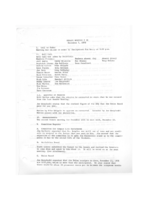Search the Special Collections and Archives Portal
Search Results

Meeting minutes for Consolidated Student Senate, University of Nevada, Las Vegas, December 7, 1976
Date
Archival Collection
Description
Text

Brad Jerbic and Tom Perrigo oral history interview: transcript
Date
Archival Collection
Description
Oral history interview with Brad Jerbic and Tom Perrigo conducted by Claytee D. White on June 26, 2019 for the Remembering 1 October Oral History Project. Brad Jerbic and Tom Perrigo share their experiences working with landscape architect Jay Pleggenkuhle to create the Healing Garden of Las Vegas after the October 1 shooting. They discuss how the community was in need of a place to mourn and heal after the tragedy, and how imperative it was for the space to be constructed quickly. Brad and Thomas share how the garden was constructed in four days and the various members of the community who helped to make it possible.
Text

Transcript of interview with Jackie MacFarlane by Claytee White, February 4, 2010
Date
Archival Collection
Description
Jacqueline "Jackie" Tilman MacFarlane was born in her grandmother's Las Vegas home at H Street and Clark Ave. Her father John Franklin Tilman was a construction worker at Boulder Dam (now Hoover) in early 1930s. Jackie recalls her family having to move several times the Great Depression and living in rural Nevada. Eventually the family came back to reside in Las Vegas. After graduating from high school, she took a waitress job at the Spot Cafe (Main & Charleston) and then at the Askew Drive-In. It was there that she met her future husband, David MacFarlane, an Air Force cadet. David continued to work at Nellis Air force Base as a civilian until he retired in 1987. Jackie describes raising her children in Fair Circle neighborhood during the 1950s and 1960s; a time when Las Vegas was just a "small town of 50,000." She felt safe and always found work in the casinos. Her work career included being a change girl at the Mint of Fremont St. and working as the front office cashier at the Desert Inn and then working at the Sands Hotel and Casino. Eventually she became a night auditor at Sands Hotel and Casino and then at Sahara Hotel and Casino from 1970-1977. She remembers working nightshift, coming home to get the kids and husband off to school and work. After leaving Sahara, she began selling Vanda cosmetics as a home business, something she still does today.
Text
Sandstone Ranch Collection
Identifier
Abstract
The Sandstone Ranch Collection is comprised of bank statements, letters, correspondence, and photographs relating to the Wilson family from 1907 to 1941. The collection includes information about the financial aspect of the Wilson Ranch, later renamed the Sandstone Ranch, located outside of Las Vegas, Nevada. The collection also includes information about the personal lives of those working on the including contracts about grazing cattle, selling cattle, and appropriation of water.
Archival Collection
Dorothy Dorothy Papers
Identifier
Abstract
The Dorothy Dorothy papers (approximately 1913-1986) document the life of singer, songwriter, columnist, pilot, and farmer, Dorothy Dorothy. Materials contain genealogy records, correspondence, business and organizational records, local history, sheet music, artifacts, and two boxes of photographic prints. Also included are materials relating to her active involvement with animal rights campaigns.
Archival Collection
JMA Architecture Studio Records
Identifier
Abstract
The JMA Architecture Studio Records are comprised of architectural records (1953-2002) created by the American architect Jack Miller and/or his architectural firm, known as both Jack Miller & Associates, Architects, & Engineers, Inc and JMA Architects, Inc. This collection includes 30.25 linear feet of materials documenting work on over 250 projects. The collection focuses on Las Vegas and Reno, Nevada. The materials feature photographs of the firm’s projects and hand-drawn architectural drawings, ranging from pencil and ink on tracing paper preliminary sketches to ink on Mylar (TM) construction documents. The drawings also contain work from a number of consultants, engineers, and other architects who collaborated on the development of the various projects. The collection includes architectural drawings for hotels, casinos, integrated casino resorts, office towers, multi-family residential developments, and custom single-family homes.
Archival Collection

William O'Neill McCurdy Sr. oral history interview: transcript
Date
Archival Collection
Description
Oral history interview with William O'Neill McCurdy by Claytee D. White on January 26, 2022 for the African Americans in Las Vegas: A Collaborative Oral History Project. In this interview, McCurdy describes his childhood growing up in Las Vegas, Nevada, graduating from Valley High School, and attending Western Nevada College in Carson City, Nevada. He worked for many years for the Parks and Recreation department, and has served on numerous boards including the Citizens' Advisory for Regional Transportation (RTC), Habitat for Humanity Board of Director, Mineral County Economic Advisory Committee, City of Las Vegas Community Block Grant Advisory Board, and Southern Nevada Regional Housing Authority Commission. Currently, McCurdy owns McCurdy & McCurdy Media Group, a political consulting and advertising firm which has assisted numerous political candidates in fulfilling their dreams of helping to govern Las Vegas, Clark County, the State of Nevada, and even in the United States Congress.
Text

Paul Chestovich oral history interview: transcript
Date
Archival Collection
Description
Oral history interview with Paul Chestovich conducted by Barbara Tabach on March 7, 2018 for the Remembering 1 October Oral History Project. In this interview, doctor Paul Chestovich describes the events on the night of the October 1, 2017 mass shooting in Las Vegas, Nevada at the University Medical Center (UMC). He discusses how he heard about the shooting and rushed to UMC to help the patients as a trauma surgeon. Doctor Chestovich shares some specific cases from that night and his emotional reaction to the shooting.
Text

Dorothy Eisenberg interview, March 8, 2017: transcript
Date
Archival Collection
Description
Multicultural advancements in Las Vegas cannot be mentioned without speaking on the monumental contributions of Dorothy Eisenberg. From 1971 to 1998, she was involved with over 25 local organizations and committees and had the honor of having an elementary school named after her. Eisenberg’s beginnings start in the midst of the all American melting pot experience though immigration. Her mother came to the United States from Russia at age twelve and her father from Austria at age sixteen to go upholstery school. Upon marriage, they settled down in Philadelphia after the World War II. They raised Dorothy and her siblings to contribute to the community despite the anti-Semitism that was displayed there on a regular basis. Signs that said, “No dogs and Jews allowed” were common place. After her first husband died, leaving her as a single mother of four little girls, she didn’t allow herself to be trampled by her circumstances by enrolling in Temple University to be a teacher at a time when the university had stigma towards older students. Upon her marriage to her second husband, the family moved to Las Vegas where she found a spiritual home for her family at Temple Beth Sholom, where her children went learned to deeply appreciate their Jewish heritage and attended Hebrew school. Having always been involved with politics in Philadelphia, she faced personal discrimination due to her religion when she was searching for organizations to involve her time. She eventually found a home with the League of Women Voters in 1965 and became involved with the Observers Corp and became aware of what was going on with the African American community from community based research and dialogue. She played a key role as president of the organization and faced heat for her involvement in the desegregation of sixth grade centers with the Kelly vs. Guinn decision in 1972 and was involved with the Welfare Rights Movement. She met Ruby Duncan and Jane Fonda, and she even showed up to the march with her daughters. Eisenberg was heavily involved with her namesake school through meetings with principals at least once a year, reading to students in the classroom, and bringing latkes to the school on Hanukkah. She continues the intergenerational legacy of educational involvement set forth by her parents with supporting her children, grandchildren and great grandchildren in the school as well. Dorothy Eisenberg is a true role model for Nevada and a pioneer for equal education in Las Vegas.
Text

Transcript of interview with Anna Sipl Meyers by Leita Kaldi Davis, February 12, 2012, February 29, 2012, March 27, 2012, April 6, 2012, April 24, 2012, May 3, 2012, May 9, 2012, May 16, 2012, October 19, 2012, November 16, 2012, & December 7, 2012
Date
Archival Collection
Description
From concentration to ownership of Las Vegas casinos, Meyers owned the Cashbah and the and Queen of Hearts in downtown Las Vegas. Interview dates: 2/12/2012, 2/29/2012, 3/27/2012, 4/16/2012, 4/24/2012, 5/3/2012, 5/9/2012, 5/16/2012, 10/19/2012, 11/16/2012, 12/7/2012.
Text
